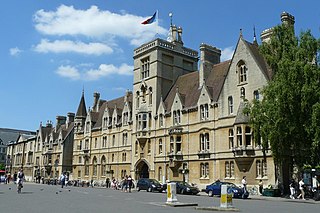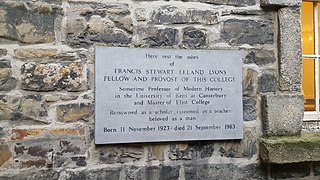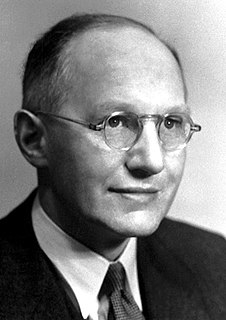Related Research Articles

Balliol College is one of the constituent colleges of the University of Oxford in England. One of Oxford's oldest colleges, it was founded around 1263 by John I de Balliol, a rich landowner from Barnard Castle in County Durham, who provided the foundation and endowment for the college. When de Balliol died in 1268 his widow, Dervorguilla, a woman whose wealth far exceeded that of her husband, continued his work in setting up the college, providing a further endowment and writing the statutes. She is considered a co‑founder of the college.

Trinity College is one of the constituent colleges of the University of Oxford in England. The college was founded in 1555 by Sir Thomas Pope, on land previously occupied by Durham College, home to Benedictine monks from Durham Cathedral.

Francis Stewart Leland Lyons was an Irish historian and academic who was Provost of Trinity College Dublin from 1974 to 1981.

Ernest Thomas Sinton Walton was an Irish physicist and Nobel laureate for his work with John Cockcroft with "atom-smashing" experiments done at Cambridge University in the early 1930s, and so became the first person in history to split the atom.

Thomas Randolph D.D. (1701–1783) was an English academic, President of Corpus Christi College, Oxford, and Christian theologian.
John Stephen Morrill is a British historian and academic who specialises in the political, religious, social, and cultural history of early-modern Britain from 1500 to 1750, especially the English Civil War. He is best known for his scholarship on Early Modern Politics and his unique county studies approach which he developed at Cambridge. Morrill was educated at Trinity College, Oxford and became a fellow of Selwyn College, Cambridge in 1975.

Ralph Bathurst, FRS was an English theologian and physician.
Francis Knyvett Leighton was an English academic and priest, who was Warden of All Souls College, Oxford, from 1858 until his death.
James Ingram was an English academic at the University of Oxford, who was Rawlinsonian Professor of Anglo-Saxon from 1803 to 1808 and President of Trinity College, Oxford from 1824 until his death.
Richard Brown was an academic at the University of Oxford. He matriculated at Hart Hall, Oxford, in 1727 at the age of 15, obtaining his Bachelor of Arts degree from Trinity College in 1731. He was made a fellow of the college in 1734, when he obtained his Master of Arts degree, with his Bachelor of Divinity degree following in 1742 and a doctorate in divinity in 1752. He was appointed as Lord Almoner's Professor of Arabic at the University of Oxford in 1748, and also became Regius Professor of Hebrew at Oxford in 1774, holding both positions until 1780. He was an ordained clergyman in the Church of England; a canon of St Paul's Cathedral, he was also appointed perpetual curate of St Mary's Paddington in 1756.
Christopher Butson, DD was a Church of Ireland bishop in the first half of the 19th century.

Rev. Thomas Lee D.D. was a 19th-century academic administrator at the University of Oxford and clergyman.
Joseph Chapman D.D. was an English academic administrator at the University of Oxford.
George Huddesford, D.D., was an English academic administrator and museum keeper at the University of Oxford.
Samuel Butcher PC was an Irish Anglican bishop in the Church of Ireland in the 19th century.
John Evans, D.D. was Archdeacon of Llandaff from 1722 to 1749 and a Canon Residentiary of Llandaff Cathedral from 1721.
Anthony Martin was an Anglican priest in Ireland during the first half of the 17th-century.
Samuel Gauntlett, DD (1745–1822) was Warden of New College, Oxford from 1792 until his death.
Henry Clarke (1700–1777) was an Irish academic.
James Drought was an Irish academic.
References
- ↑ Alumni Oxon
- ↑ 'A History of the County of Oxford': Volume 3, Pages 238-251: the University of Oxford. Originally published by Victoria County History, London, 1954
- ↑ Hopkins, Clare (2005), Trinity: 450 years of an Oxford college community (2007 reprint ed.), Oxford, ISBN 978-0-19-951896-8
- ↑ CCEd

